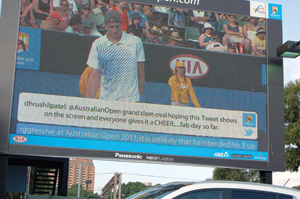When was the last time you were at a party where a stranger asked you to come to a time-share pitch meeting? Chances are, it’s never happened. Similarly, posting a “Buy our 4-game Fast Pack NOW, offer ends Sunday!!” message via a social media channel probably has led to few conversions. Just like at a party, you have to make friends online, be likable and blend into the environment before you ask for favors.
Social media is about building authentic relationships with your audience. Just like relationships in the physical world, you can’t fake it. How do you do this? Provide value to your audience when, where and how they want to receive it. Whether you’re a fan, sports team owner, athlete, league employee, business executive, mom, student or Steve Jobs, everyone needs to see the value and effort to engage in a relationship.
Everyone wants to know how to monetize their brand’s social presence, but social media channels were not invented to accommodate business transactions. The space is alive; it has a short shelf life, and humans have full control.
Social marketing is counterintuitive to traditional marketing. We must remember humans connect with humans, not logos. Athletes, executives, general managers, coaches and owners are the true faces of the brand because their personalities are most exposed to fans and are the most desired by the fans. The quickest way to develop an effective social media plan is to help those personalities understand the value of social media, get them personally involved, and have them empower the right internal team to drive the strategy development and activation.
Unlike traditional marketing, results and monetization are part of an in-depth, two-way process. Relationships take time. However, with more than 700 million users (or, 700 million potential “friends”) on Facebook and another 200 million on Twitter, it’s worth the investment for your brand to spend time and build lasting relationships.
 |
TENNIS AUSTRALIA
The Australian Open engaged fans on Twitter by displaying favorite tweets on a large digital video board on the tournament grounds. |
In monitoring these relationships, no measurement dashboard or analytics tool will ever replace the human eye or ear. My philosophy and approach at Digital Royalty largely revolves around organic listening complemented by various tools and analytical dashboards. Fans will tell you the next logical step to take if you’re listening. The process is very simple:
■ Listen. Hear what your audience is talking about and what’s important to them. Develop a plan suitable to reach business objectives.
■ Experiment by activating the strategy via social tactics.
■ Listen again to your audience’s response and identify key takeaways.
■ Measure. Evaluate results based on engagement, audience growth, fan sentiment and conversion.
■ Refine and repeat. Based on results, improve the strategy, activation and measurement approach. Eventually, experiments turn into best practices.
So, who is doing this well?
NBA: The NBA has long been the front-runner among professional leagues in terms of its social media presence. With more than 10 million fans between its Facebook and Twitter pages, its influence is substantial. A combination of factors have led to its success. Like most other leagues, the NBA uses its accounts to leverage exclusive content provided by individual teams and athletes. But what sets it apart is its ability to reach a global audience. The league has created a Facebook tab that links to 12 international NBA pages, including India, France and Spain. While the NBA has been known to bridge the physical and virtual worlds, it is also overcoming language and cultural barriers to connect with its audience. More recently, the NBA has had to overcome social media challenges as a result of the lockout. Fortunately, the NBA is better positioned to progress through this as a result of their building an engaged fan base through social media.
New Jersey Devils: The NHL team this year unveiled a unique strategy for providing new content across its social media channels. It employed the help of the people who respect its brand most — its fans — to manage the team’s Twitter and Facebook accounts. Twenty-five dedicated fans were selected from those who consistently engaged in online conversations. The Devils Army Generals, as they are called, work from Mission Control, a computer lab residing at the team’s executive office. Generals are responsible for creating content and monitoring trends. The unique approach adds a level of authenticity to the brand’s messaging while strengthening the team’s network of fans.
Australian Open: In January, the Open streamed fan tweets on a large digital outdoor board on-site. If they “favorited” your tweet, it was displayed, and fans were able to see it on the event’s website or in person. This was an effective way of increasing engagement and bridging the physical world with the virtual world. Their social media and online optimization efforts resulted in 10 million unique website viewers in two weeks. In the future, organizers could bridge the virtual and physical worlds by integrating social media into traditional marketing, including links to social media or marketing collateral. They could also purchase a promoted trending topic on Twitter to lead those unaware of their online presence into the already active conversation.
Amy Martin (amy@thedigitalroyalty.com), founder of Digital Royalty, develops social media strategies for sports teams, leagues, athletes and corporate brands.





